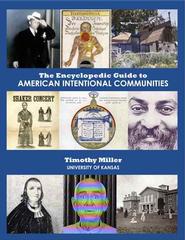
In publishing circles, “essential” isn’t a word to be tossed around lightly. Although every academic book advances our understanding of its subject in some way, there are not many books that are so vital to a field that scholars can’t work without them.
But at 586 pages and containing more than 3,000 entries, Professor Timothy Miller’s Encyclopedic Guide to American Intentional Communities can truly be called “authoritative,” “comprehensive,” and yes, even “essential.”
It was this last word that the popular trade publication Choice attached to Miller’s book in their review of it this year. Choice is a publication that academic and popular librarians across the country refer to when making new purchases for their collections, and very few books achieve their “essential” rating. At the end of every year, Choice presents awards to the top books that they’ve reviewed in the past 12 months, and Miller’s, along with several others, made the cut. Typically, the books that win this award are published by large university presses like Oxford, but Miller’s book was published right here on the Hill by the Richard W. Couper Press.
“I was really thrilled when the review came out,” Randall Ericson, editor of the Richard W. Couper Press said. “[Miller’s book] was a massive undertaking, and I think it will be the standard for decades, so it was nice to get that affirmation.”
Few colleges of Hamilton’s size can boast their own press, never mind one that has won a Choice award. But for Hamilton, a dedicated press was the best way to highlight the breadth of Hamilton’s Archives and Special Collections, which include thousands of primary sources on a variety of topics. Among them is perhaps the finest collection of sources relating to American intentional communities—religious and secular groups that decide to live together for mutual benefit—like the Shakers, or the nearby Oneida Community.
“Hamilton is pretty much the center for Shaker studies,” Director and Curator of Special Collections Christian Goodwillie said. The press, he noted “allows us to get this information out there to a wider public.”
According to Ericson, the press serves two purposes. “The press provides a venue for disseminating scholarship on communal studies—promoting both scholarship and Hamilton as a center of scholarship.”
Books printed by the Couper Press are used within the College as textbooks, and the press publishes American Communal Societies Quarterly, one of the leading journals on communal societies in the country.
Ericson conceptualized the idea for an independent college press in 2005, after publishing a monograph on Ezra Pound. That process, he recalled, gave him some insight into what it would be like to run a press. As the idea for a press began to form, he sat down with Patsy Couper, who, along with her late husband Richard ’44, have generously supported Hamilton in general and the Burke Library in particular for many years. The idea excited Couper immediately.
“Before I could even ask the question,” Ericson recalled, “Patsy said ‘well maybe we can use some of Dick’s money for this!’”
The press published its first two books the very next year: a monograph on the Shakers, as well as the prison diary of Chester Gillette, a man accused and convicted of murdering his pregnant girlfriend in the Adirondacks in the early 20th century, a case which scandalized polite society of the day. Hamilton possesses Gillette’s original diary in its Special Collections.
The monograph on Gillette is just one example—albeit macabre—of the range of publications the press produces. Goodwillie stresses that although the press publishes many periodicals relating to American communal societies, they’re always looking to “widen the scope a little bit.”
“One of the purposes of the press is to publish things related to the areas of interest in Special Collections,” he said. To that end, the press will publish a book of Samuel Kirkland’s letters later this year. Written in the Oneida dialect that he learned during the course of his missionary work, this will be the first time the letters have ever been published. Cliff Abbot, a linguist at the University of Wisconsin, completed the translation.
Also forthcoming is a scholarly bibliography on imprints produced by the House of David, a Michigan-based communal religious society based known for its barnstorming baseball teams. “It’s a really authoritative work,” Goodwillie said. “Hamilton has arguably the best collection of House of David material in the country.”
With eight other books in various stages of completion, it appears as though the Couper Press is going to remain “essential” on campus for a long time, as well as—how else to put it?— an impressive resource for scholars.
Posted February 17, 2014
